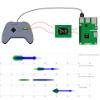Project: Latency Measurement

We measure and model the latency of different components in computer systems and its effect on user performance. Our research strengthens theoretical foundations and gives practical guidance for researchers, developers, and users.
Status: ongoing
Runtime: 2017 -
Participants: Raphael Wimmer, Florian Bockes, Andreas Schmid, Vitus Maierhöfer
Keywords: latency, prototype, USB, mouse, keyboard, joystick, gamepad, input device, input, output, display
Introduction
Processing time is an inherent property of all computer systems. In human-computer interaction, this leads to latency between user input and system response. As there is no latency in the physical world, physical-digital applications should be designed with the goal of minimizing latency. In order to minimize the latency of a system, measuring it is a necessary first step to find bottlenecks within the processing pipeline.
The end-to-end latency between user input and system response comprises several partial latencies, for example the latencies of input and output devices, as well as processing times of the operating system and user space applications. As those partial latencies interfere with each other due to polling, scheduling, and other delays, we regard it as necessary to measure all of those partial latencies individually. To this end, we developed different methods for measuring such partial latencies.
If possible, we use cheap and off-the-shelf components for our measuring devices and release all source code and circuit diagrams to the public. This way, our measuring devices can be replicated by others to validate our results and measure the latencies of device we don't have access to.
News
PDA group at Workshop on Esports and High Performance HCI 2021 (2021-04-10)
Andreas Schmid will present a short paper on a new method for measuring end-to-end latency at the first Workshop on Esports and High Performance HCI, co-located with CHI'21. Further information on can be found on the project page. (more...)
DispLagBox at Mensch und Computer 2020 (2020-09-01)
We will present DispLagBox, a precise and easily replicable device for measuring display latency, as a short paper at Mensch und Computer 2020. (more...)
New paper: On the Latency of USB-Connected Input Devices (2019-05-09)
We presented our paper "On the Latency of USB-Connected Input Devices" at CHI 2019 in Glasgow. (more...)
PDA Group at CHI '2018 (2018-04-21)
We will present a poster and a workshop paper at CHI 2018. (more...)
Latency Research in the PDA group
This page serves as an overview of our research on latency. More detailed information on individual projects can be found on the corresponding project pages.
Project Goals
- Get a better understanding of latency and latency jitter
- Develop tools for exactly measuring the latency of input devices, displays and software
- Provide users with advice on which hardware to choose
Projects and Current Status (2021-10-10)
- Method for measuring Input Device Latency (finished)
- Yet Another Latency Measuring Device: a simple method for measuring end-to-end latency (finished)
- Effect of Latency on User Performance (work in progress)
- Measuring and comparing the latency of different graphics frameworks and rendering engines (work in progress)
Upcoming and Future work:
- conducting a small study on the effects of input latency on performance in a simple game (first study conducted, second study needs to be prepared)
- test more, current, devices (when time permits)
- measure the latency of audio devices (audio interfaces, speakers/headphones)
Publications

Florian Bockes, Raphael Wimmer, Andreas Schmid
CHI EA '18 Extended Abstracts of the 2018 CHI Conference on Human Factors in Computing Systems
Development of a tool for measuring latency of different USB devices (Tweet this with link)

Raphael Wimmer, Andreas Schmid, Florian Bockes
Proceedings of the 2019 CHI Conference on Human Factors in Computing Systems (CHI '19)
Summary of our current understanding of latency and our approach of measuring the latency of USB-connected devices. (Tweet this with link)

Patrick Stadler, Andreas Schmid, Raphael Wimmer
Proceedings of the Conference on Mensch und Computer 2020
Easily replicable device for measuring the reaction time of displays. (Tweet this with link)

Andreas Schmid, Raphael Wimmer
Workshop on Esports and High Performance HCI 2021
Measuring device for end-to-end latency based on cheap off-the-shelf components. (Tweet this with link)

Andreas Schmid, Raphael Wimmer
Extended Abstracts of the 2023 CHI Conference on Human Factors in Computing Systems
We implemented and evaluated a new method for measuring the latency added by different graphics frameworks and toolkits on X11-based systems. (Tweet this with link)
Press Coverage
- PC Games Hardware, Andreas Link (10.05.2019, German): Wissenschaftliche Studie: Wie schnell sind Mäuse, Tastaturen und Gamepads wirklich?
Further Resources
All Related Posts
PDA group at Workshop on Esports and High Performance HCI 2021 (2021-04-10)
Andreas Schmid will present a short paper on a new method for measuring end-to-end latency at the first Workshop on Esports and High Performance HCI, co-located with CHI'21. Further information on can be found on the project page. (more...)
DispLagBox at Mensch und Computer 2020 (2020-09-01)
We will present DispLagBox, a precise and easily replicable device for measuring display latency, as a short paper at Mensch und Computer 2020. (more...)
New paper: On the Latency of USB-Connected Input Devices (2019-05-09)
We presented our paper "On the Latency of USB-Connected Input Devices" at CHI 2019 in Glasgow. (more...)
PDA Group at CHI '2018 (2018-04-21)
We will present a poster and a workshop paper at CHI 2018. (more...)